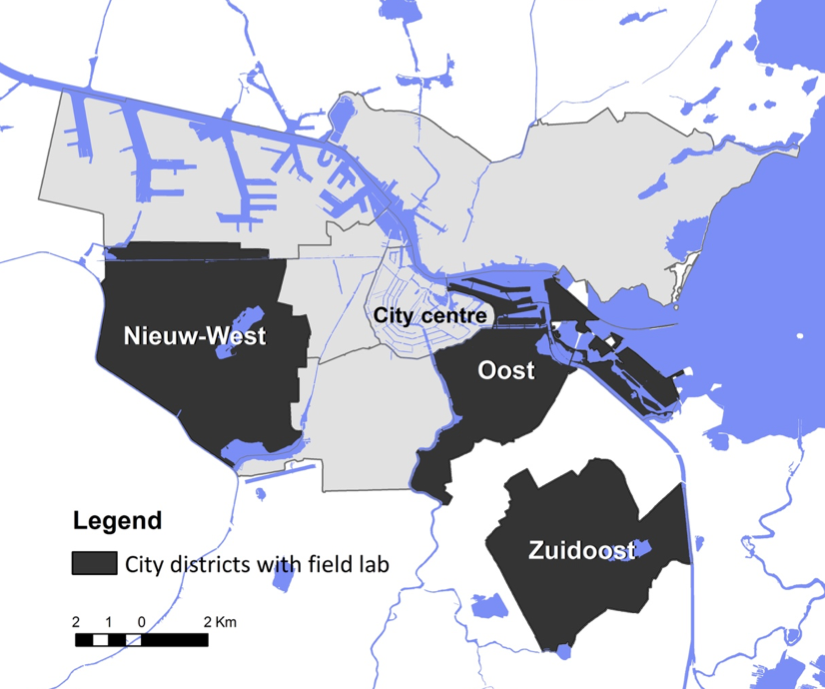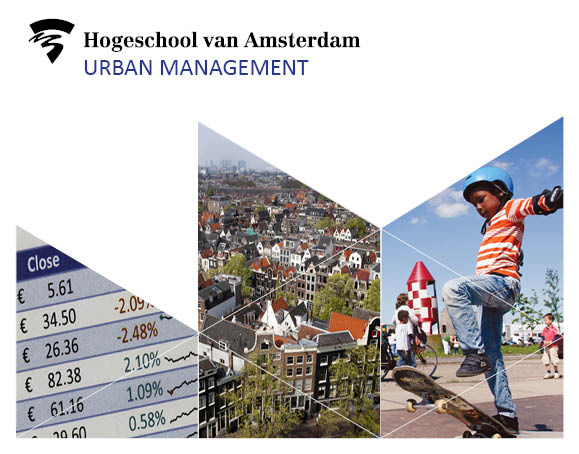Historically Labelled Living Labs
Since its formation in 2006 ENoLL has labelled 440+ Living Labs. See the full list of Labelled Living Labs who are not active members of the network.
 Urban Management - Fieldlabs
Urban Management - Fieldlabs
The UM fieldlabs were initiated in collaboration with stakeholders in three areas in the city:
Together with local stakeholders, a shared long-term research and innovation agenda is formulated at the start of each fieldlab. To ensure a focus on challenges that are specific for the areas in which the fieldlabs are based, the local strategic development plan of the city district forms the starting point in developing this agenda.
Formally, the field labs are a knowledge alliance between the city district and the Amsterdam University of Applied Sciences formalised in a mutual long-term agreement. Together the AUAS and the city district fund between 50 – 75 percent of the budget of the activities in the field lab. This construction ensures the stability of the field lab. The remainder of the budget is provided by participants in the specific projects. As a result, a fieldlab with several projects is funded by multiple stakeholders which supports the open innovation character of the fieldlabs. The city district and AUAS maintain a local infrastructure of a fieldlab team that is responsible for the organisational aspects of the fieldlabs. They also safeguard the core values of the fieldlab, such as the openness to newcomers, the focus on tangible results and local value as well as the interdisciplinary approach to urban issues.
The UM fieldlabs function as continuous learning environments focusing on the development of knowledge, but also on the improvement of practice through direct application of acquired knowledge in tangible interventions. Because of the dynamic, complex and multi-faceted character of urban issues, addressing them will never be possible by only focusing on one aspect. Therefore, an integrated approach is used. The aim is that innovation with regard to social, physical, economic and political/governance aspects will be mutually reinforcing.

Look! A healthy neighbourhood (Kijk! Een gezonde wijk)
Fieldlab location: Nieuw-West; start date: 1 october 2014; contact person: Lea den Broeder; Website.
A broad spectrum of neighborhood aspects can affect the health of local residents. In this project, we work together with health professionals and citizens to identify strong and weak points concerning health in the city district of Nieuw-West. Two goals were set at the start of the project:
(1) to activate and empower residents in making their neighborhood a healthier place, and
(2) to increase and improve the information on health aspects of the city district, with and for local residents. In a process of co-creation we design, test and evauate an approach and instrument – namely a participatory district app for the smartphone. In order to maximaze user involvement, we also work on a method to involve and activate people who don’t want to or cannot use the app.
The climate proof neighbourhood (De klimaatbestendige wijk)
Fieldlab location: Oost; start date: 9 november 2015; contact person: Jeroen Kluck; Website.
Climate proofing the city is a governance challenge in a multi-stakeholder arena where not all parties recognise the urgency and interest conflicts can arise. The central question that is addressed in the project is how to ensure that businesses, residents, interest groups and various levels of government take measures that effectively contribute to climate proofing the neighbourhood? The hypothesis is that by facilitating new initiatives involving stakeholders who are not usually included in decision making about urban design (e.g. residents, housing corporations, schools and sport clubs), climate proofing can be addressed – as well as other urban issues such as health and the liveability. In this project we utilise monitoring information about the impacts of design decisions on local climate issues (e.g. urban flooding or heat islands) and costs and benefits to facilitate decision making.
Youth and debt (Jongeren en schulden)
Fiedlab location: Zuidoost; start date: 5 november 2015; contact person: Roeland van Geuns; Website
Three huge phone bills, a handful of fines and a special course to get your licence back after being disqualified from driving; the result is a substantial debt from which it is difficult to recover. This is a familiar situation for many young people in the Zuidoost district. Being in debt is a significant obstacle in the development towards independence. How can we and our partners find new, more suitable forms of support to increase the financial self-reliance and economic independence of young people in Zuidoost? And how do young people feel about this? These questions are the focus of this research. We combine knowledge with programmes offered in Zuidoost and link this to the latest evidence-based methods in order to explore the possibilities of enabling young people to develop new skills so that they can make the right decisions in the future.
The UM fieldlabs are local innovation milieus aiming to contribute to the social innovation needed to address multi-scalar, multi-actor and mulit-diciplinary urban challnges. The fieldlabs focus on user-driven co-creation at the neighbourhood level. A multi-diciplinary research team that is constituted based on the nature of the issue at hand is involved to ensure well informed decisions are make. Finally, the field labs provide a place where AUAS students can develop research and practical skills.


Given the diversity of fieldlab projects we do not use just one method. Rather, proposed projects are required to satisfy a number of criteria.
1) The project is problem driven and focused on improving local practice through the integration of state of the art research findings.
2)The needs of local partners are leading and they play an active role in setting up the living lab, implementation and the definition of a multi-stakeholder research agenda.
3)The project aids in understanding complex urban issues and makes a long-lasting contribution to addressing concrete challenges in the city.
4)The project is multi-diciplinary both in terms of pratice participants and researchers from the AUAS (e.g. urban technology, poverty and participation)
5) A variety of types of activities are carried out including research and interventions in practice in which students from the AUAS are able to participate and contribute, building valuable skills for their future employment.
6) Projects combine theory and practice by using research findings as mentioned above as well as theory developmnet and refinement through testing in the field lab practice.
Prior to the start of the projects an interdiciplinary team assesses the extent to which these criteria are met.
Since its formation in 2006 ENoLL has labelled 440+ Living Labs. See the full list of Labelled Living Labs who are not active members of the network.